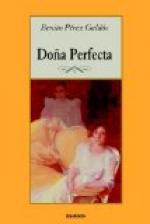At last she fell into a doze. In her uneasy sleep her imagination reproduced in her mind all she had done that night, distorting it, without altering it in substance. She heard again the clock of the cathedral striking nine; she saw with joy the old servant fall into a peaceful sleep; and she left the room very slowly, in order to make no noise; she descended the stairs softly, step by step and on tiptoe, in order to avoid making the slightest sound. She went into the garden, going around through the servants’ quarters and the kitchen; in the garden she paused for a moment to look up at the sky, which was dark and studded with stars. The wind was hushed. Not a breath disturbed the profound stillness of the night. It seemed to maintain a fixed and silent attention—the attention of eyes that look without winking and ears that listen attentively, awaiting a great event. The night was watching.
She then approached the glass door of the dining-room and looked cautiously through it, from a little distance, fearing that those within might perceive her. By the light of the dining-room lamp she saw her mother sitting with her back toward her. The Penitentiary was on her right, and his profile seemed to undergo a strange transformation, his nose grew larger and larger, seeming like the beak of some fabulous bird; and his whole face became a black silhouette with angles here and there, sharp derisive, irritating. In front of him sat Caballuco, who resembled a dragon rather than a man. Rosario could see his green eyes, like two lanterns of convex glass. This glow, and the imposing figure of the animal, inspired her with fear. Uncle Licurgo and the other three men appeared to her imagination like grotesque little figures. She had seen somewhere, doubtless in some of the clay figures at the fairs, that foolish smile, those coarse faces, that stupid look. The dragon moved his arms which, instead of gesticulating, turned round, like the arms of a windmill, and the green globes, like the lights of a pharmacy, moved from side to side. His glance was blinding. The conversation appeared to be interesting. The Penitentiary was flapping his wings. He was a presumptuous bird, who tried to fly and could not. His beak lengthened itself, twisting round and round. His feathers stood out, as if with rage; and then, collecting himself and becoming pacified, he hid his bald head under his wings. Then the little clay figures began to move, wishing to be persons, and Frasquito Gonzalez was trying to pass for a man.




